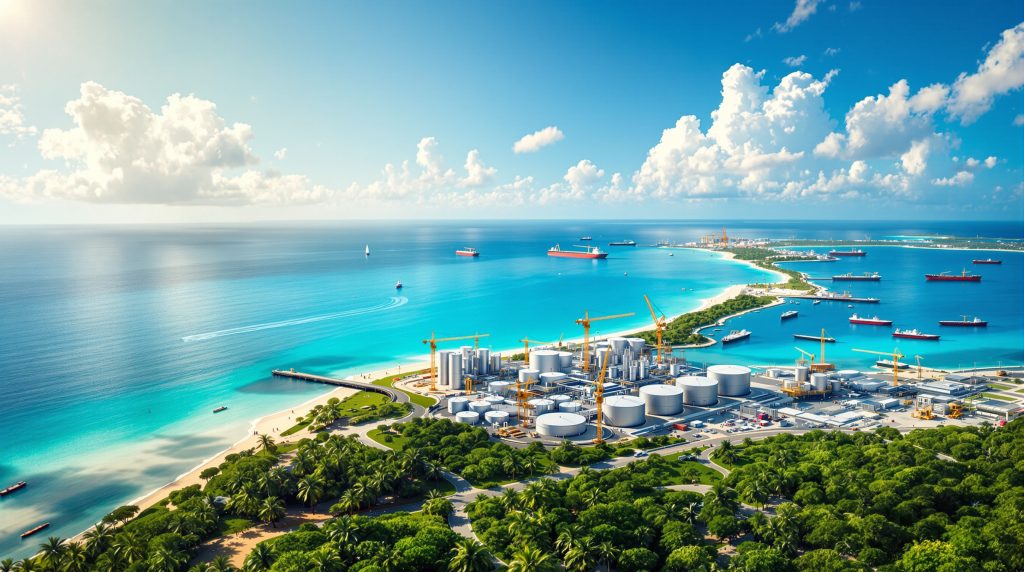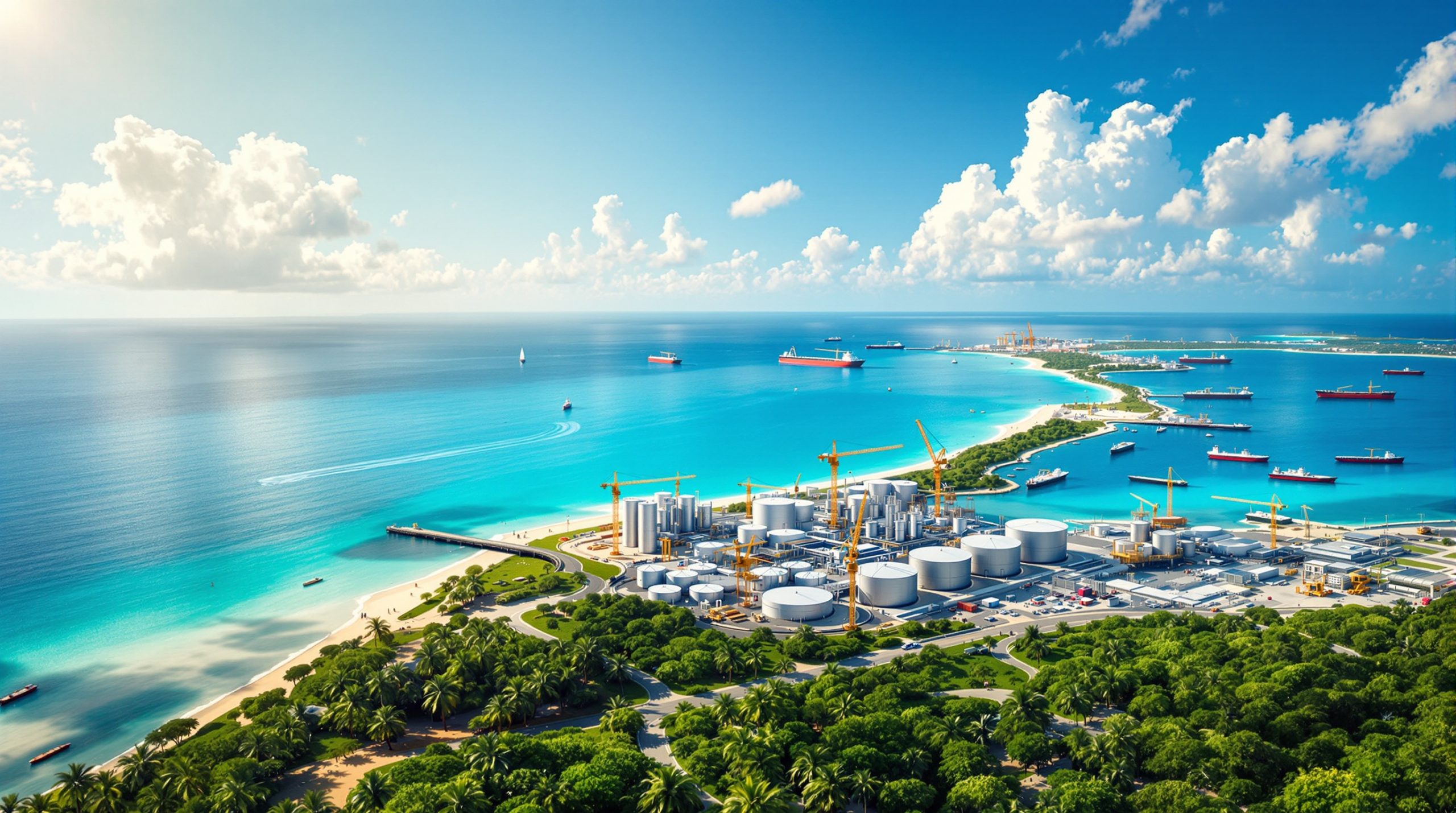Strategic Policy Framework Behind the Area 1 Restart Decision
The Rovuma Basin's strategic significance extends far beyond conventional offshore development zones, representing a transformational energy asset that could reshape East Africa's economic landscape. Understanding the policy mechanisms behind the Mozambique LNG Area 1 project approval requires examining institutional coordination frameworks and governance structures that enable large-scale energy project implementation in post-conflict environments.
Cabinet Resolution Mechanics and Governance Structure
The Council of Ministers' approval process formalised on November 18, 2025, established a structured framework for project reactivation following 4.5+ years of force majeure suspension since March 2021. This institutional coordination represents a significant governance milestone, demonstrating improved capacity for managing complex extractive sector decisions in challenging operational environments.
President Daniel Chapo's commitment to reach a conclusion within a week of his public remarks created institutional momentum that culminated in formal cabinet ratification. The timeline demonstrates enhanced decision-making efficiency compared to typical large-scale African energy project approvals, which often extend across multiple government sessions and ministerial consultations. Furthermore, this efficiency reflects broader trends in mining industry evolution where streamlined approval processes become competitive advantages.
The resolution establishes conditions for orderly reactivation whilst preserving government oversight mechanisms. This approach reflects lessons learned from other major African energy projects where inadequate governance frameworks created implementation challenges and stakeholder conflicts. However, the success of such projects often depends on thorough permitting process insights that ensure regulatory compliance throughout the development cycle.
Independent Audit Requirements as Risk Mitigation Strategy
Central to the cabinet decision is the mandatory independent audit of all costs accumulated during the force majeure suspension period. This transparency mechanism serves multiple strategic purposes:
- Technical accuracy verification of accumulated expenditures during the suspension
- Government contestation rights preservation to challenge cost calculations
- Institutional oversight confidence reinforcement through third-party validation
- Risk mitigation for both government and consortium stakeholders
The audit framework represents a notable governance innovation in African energy project management. Rather than accepting consortium cost claims without verification, the government established independent validation requirements whilst maintaining contestation rights. Consequently, this approach balances investor confidence needs with sovereign oversight responsibilities.
Force majeure cost verification protocols create transparency standards that could influence governance approaches for other large-scale extractive projects across Africa. The mechanism demonstrates how post-conflict states can maintain institutional authority whilst facilitating private investment resumption.
How Will the 30-Year Development Term Reinstatement Impact Investment Flows?
The reinstatement of the 30-year development term addresses fundamental financing constraints that emerged during the suspension period. Long-cycle energy infrastructure projects require extended contractual certainty to enable debt structuring and capital allocation across multi-decade revenue streams.
Contractual Predictability and Financing Confidence Restoration
Temporal risk represents one of the most significant challenges for project financiers in the LNG sector. The suspension period created uncertainty regarding contract duration calculations, potentially affecting loan covenant compliance and repayment scheduling for the approximately $20 billion investment—Africa's largest private investment ever undertaken.
The development term restoration enables:
- Long-cycle capital allocation planning alignment with operational timelines
- Debt facility structuring across extended repayment periods
- Revenue stream projection certainty for financial modelling
- Export credit agency participation facilitation through reduced temporal risk
Financier risk assessment methodologies typically incorporate contract duration as a primary variable in project finance evaluation. The reinstatement removes a critical constraint that could have affected borrowing costs and credit facility availability for the consortium led by TotalEnergies. Moreover, effective investment risk management becomes crucial when evaluating such large-scale, long-term commitments.
Capital Allocation Scenarios for Resumed Operations
The structured approach to remobilisation requires coordinated capital deployment across multiple operational phases. Understanding these capital allocation patterns provides insight into economic stimulation timelines and sector-specific investment flows.
Phase 1 Capital Deployment (0-6 months):
- Administrative completion and regulatory compliance verification
- Contractor reactivation and personnel mobilisation
- Site preparation and security protocol implementation
Phase 2 Investment Focus (6-18 months):
- Infrastructure rehabilitation and equipment recommissioning
- Supply chain reestablishment and logistics coordination
- Community engagement programme expansion and implementation
Phase 3 Production Preparation (18+ months):
- LNG facility testing and commissioning
- Export infrastructure completion and certification
- Market delivery preparation and buyer coordination
Local procurement chain reactivation represents a significant economic multiplier opportunity. The suspension period disrupted established supplier relationships and service provider networks that previously supported project operations.
What Are the Broader Economic Implications of Africa's Largest Private Investment Resuming?
The economic implications extend beyond the immediate project site, creating multiplier effects across multiple sectors of Mozambique's economy. The $20 billion investment scale positions this restart as a catalyst for broader economic development patterns.
Sectoral Multiplier Effects Analysis
| Economic Sector | Direct Impact | Timeline | Estimated Value Chain Activation |
|---|---|---|---|
| Logistics & Transport | Port facility utilisation | 6-12 months | $500M+ annual throughput |
| Local Services | Contractor remobilisation | 3-6 months | 15,000+ indirect jobs |
| Procurement Networks | Supply chain reactivation | 12-18 months | $2B+ local content potential |
Progressive remobilisation of Area 1 operations would stimulate local services, logistics, and procurement chains that remained subdued during the suspension period. The cascade effect encompasses direct employment creation in construction and operations, indirect employment through supplier networks, and induced economic activity through wage circulation in local economies.
The 15,000+ indirect jobs projection reflects the extensive service network required to support large-scale LNG operations. These positions span accommodation services, transportation, catering, maintenance, and specialised technical support across the Cabo Delgado region. In addition, this project demonstrates the significant mineral beneficiation opportunities that large-scale resource projects can create within regional economies.
Port facility utilisation represents a critical infrastructure activation component. The $500M+ annual throughput estimate reflects not only LNG export volumes but also the extensive import requirements for equipment, materials, and supplies needed for sustained operations.
Regional Energy Security Positioning
Mozambique's return as a future LNG exporter strengthens the country's position within Southern African energy diversification strategies. The project restart occurs at a time when regional energy security considerations prioritise supply source diversification and infrastructure development.
The Rovuma Basin's extensive reserves continue to shape both Mozambique's long-term economic outlook and regional energy discussions. Strategic positioning relative to other African LNG projects creates competitive advantages through:
- Geographic proximity to Asian and European markets
- Infrastructure development in the Afungi region
- Established regulatory frameworks for LNG exports
- Regional integration opportunities through cross-border energy cooperation
SADC energy cooperation framework strengthening represents a broader regional benefit. Mozambique's successful project restart demonstrates capacity for large-scale energy infrastructure development, potentially catalysing similar projects across the region.
How Does the Security Environment in Cabo Delgado Affect Project Viability?
Security considerations in Cabo Delgado require careful management, though conditions have improved substantially relative to the most challenging conflict years between 2020-2022. The cabinet approval reflects assessment that the security trajectory supports industrial operation viability.
Conflict Resolution Progress and Operational Risk Assessment
The decision to authorise project restart demonstrates confidence in security improvements achieved through multi-national force coordination in northern Mozambique. Whilst specific casualty figures and conflict intensity metrics remain sensitive, the operational environment is characterised as gradually becoming more conducive to controlled resumption of activity.
Risk management protocols for industrial operations in post-conflict zones typically involve:
- Multi-layered security coordination between government, regional, and private security forces
- Site protection frameworks integrated with operational planning
- Personnel safety procedures and evacuation protocols
- Community relations programmes designed to maintain social licence
The structured approach to security management positions the project as a potential model for responsible resource development in post-conflict environments across Africa. This framework demonstrates how extractive projects can proceed in challenging security contexts through comprehensive risk management. Furthermore, lessons from the TotalEnergies Mozambique LNG restart indicate that improved security coordination has been crucial for renewed investor confidence.
Community Relations and Social Licence Frameworks
Long-term social development commitments in the Afungi area represent critical components of operational sustainability. Community relations strategies must address both immediate security concerns and long-term development expectations.
Local stakeholder engagement strategies include:
- Traditional leader consultation and authority recognition
- Community benefit-sharing arrangements and implementation mechanisms
- Resettlement and compensation programmes with appeals procedures
- Local employment creation and skills development initiatives
Social licence maintenance requires ongoing dialogue with community representatives and transparent benefit distribution. The suspension period created opportunities to reassess and improve community relations approaches based on lessons learned from previous operational phases.
Critical Insight: Community acceptance represents a fundamental requirement for sustained operations in the Cabo Delgado region, requiring continuous engagement and transparent benefit-sharing mechanisms to maintain social licence throughout the project lifecycle.
What Role Does Global LNG Market Dynamics Play in Project Timing?
Global LNG market dynamics create favourable conditions for Mozambique's project restart, with demand centres increasingly prioritising supply source diversification. This market environment provides strategic opportunities for new African exporters to capture market share in Asia-Pacific and European markets.
Supply Chain Diversification Trends
European and Asian energy purchasers actively seek to diversify LNG supply sources as strategic response to energy security concerns. This creates market access opportunities for emerging African producers beyond traditional LNG exporters including Australia, Indonesia, and Qatar. However, investors should carefully consider share market performance insights when evaluating energy sector investments.
The timing alignment between Mozambique's restart and current buyer preference frameworks creates improved market entry conditions compared to the original development period prior to 2021. Supply security considerations now carry greater weight in procurement decisions, potentially providing pricing premiums for diversified supply sources.
Market access strategies for Asian and European buyers benefit from:
- Established shipping routes from the Mozambican coast
- Flexible contract structures accommodating buyer diversification needs
- Competitive production costs relative to newer LNG developments
- Reliable supply potential from the Rovuma Basin reserves
Competitive Positioning Analysis
Mozambique's cost competitiveness versus established LNG exporters reflects several structural advantages. The Rovuma Basin's offshore reserves offer economies of scale potential, whilst existing infrastructure development reduces capital requirements compared to greenfield projects.
Infrastructure advantages of the Rovuma Basin location include:
- Deep water access suitable for large LNG carriers
- Proximity to major shipping lanes connecting to Asian markets
- Established port facilities and logistics networks
- Regional stability relative to other emerging LNG provinces
The project restart positions Mozambique to capture market share during a period when buyer interest in supply diversification creates opportunities for new entrants. This timing advantage could not have been anticipated during the original development planning phase.
Which Investment Climate Reforms Support the Project's Long-Term Success?
The cabinet approval signals broader investment climate enhancement efforts that extend beyond the immediate project. Government commitment to provide institutional and decision-making support suggests intention to bring coherence to large-scale project execution frameworks.
Regulatory Environment Modernisation
Investment protection frameworks and dispute resolution mechanisms require continuous improvement to maintain international investor confidence. The independent audit requirement demonstrates enhanced transparency standards that could influence governance approaches across Mozambique's extractive sector.
Institutional capacity building for large-scale project oversight reflects lessons learned during the suspension period. Enhanced governance capacity enables more effective management of complex extractive projects whilst maintaining sovereign oversight responsibilities.
Transparency mechanisms for extractive sector governance create standards that benefit both investors and government stakeholders. The contestation rights preservation within the audit framework balances investor needs with government oversight requirements.
Foreign Direct Investment Facilitation Measures
Currency stability and repatriation guarantee structures remain critical for large-scale energy investments. The project's $20 billion scale requires sophisticated financial frameworks to manage foreign exchange exposure and cross-border capital flows.
Tax regime optimisation for long-cycle energy projects involves balancing government revenue generation with investment attraction. The 30-year development term reinstatement requires corresponding fiscal framework stability to maintain investor confidence throughout the extended project lifecycle.
Export credit agency participation depends on robust regulatory frameworks and transparent governance mechanisms. The independent audit requirement could facilitate multilateral development bank participation through enhanced oversight credibility. Moreover, understanding cost escalation reports helps investors appreciate the importance of transparent cost management in large-scale projects.
How Will Operational Remobilisation Proceed in Practice?
Structured implementation phases enable coordinated resumption of operations whilst managing complex logistical and regulatory requirements. Understanding these phases provides insight into economic activation timelines and sector-specific development patterns.
Phased Restart Implementation Strategy
Phase 1: Administrative Completion (0-6 months)
- Final government approvals and permit validation processes
- Independent audit completion and cost verification procedures
- Contractor reactivation and personnel mobilisation coordination
- Security protocol implementation and site preparation activities
- Community engagement programme expansion and stakeholder consultation
Phase 2: Construction Resumption (6-18 months)
- Infrastructure rehabilitation and equipment recommissioning projects
- Supply chain reestablishment and logistics coordination networks
- Local procurement activation and supplier qualification processes
- Environmental compliance verification and monitoring system implementation
- Skills development programmes and local employment creation initiatives
Phase 3: Production Preparation (18+ months)
- LNG facility testing and commissioning procedures
- Export infrastructure completion and certification processes
- First cargo preparation and quality assurance protocols
- Market delivery coordination and buyer relationship management
- Long-term operational sustainability framework implementation
Critical Success Factors and Potential Obstacles
Weather window optimisation for construction activities requires careful coordination with seasonal patterns in the Cabo Delgado region. Cyclone seasons and monsoon periods create specific constraints that must be integrated into project scheduling.
International contractor availability and cost inflation management represent significant challenges following the extended suspension period. Global supply chain disruptions and inflationary pressures could affect remobilisation costs and timeline execution.
Critical success factors include:
- Regulatory compliance maintenance throughout restart processes
- Community relations continuity and stakeholder engagement
- Security coordination effectiveness across multiple agencies
- Financial facility availability and cost management
- Technical expertise retention and knowledge transfer
Potential obstacles encompass both domestic and international factors:
- Supply chain constraints and equipment availability
- Skilled personnel recruitment in specialised technical fields
- Infrastructure rehabilitation costs and timeline extensions
- Market volatility impact on financing and revenue projections
- Regulatory compliance requirements and approval processes
What Are the Long-Term Implications for Mozambique's Economic Development?
The project restart creates foundations for sustained economic growth through energy sector development, regional integration enhancement, and international investment attraction. These implications extend beyond immediate revenue generation to encompass structural economic transformation opportunities.
Structural Economic Transformation Potential
Revenue generation projections from the $20 billion investment could significantly impact Mozambique's fiscal position and development spending capacity. LNG export revenues would provide foreign currency earnings that support broader economic stability and infrastructure development financing.
Human capital development through technology transfer represents a critical long-term benefit. Large-scale energy operations require extensive skills development programmes that create capabilities extending beyond the immediate project:
- Technical training programmes in LNG operations and maintenance
- Management development in large-scale project coordination
- Engineering expertise in offshore energy infrastructure
- Financial management skills in international project finance
- Environmental management capabilities for extractive industries
Industrial diversification opportunities beyond extractives could emerge through backward and forward linkages. The project creates demand for manufacturing, services, and logistics capabilities that could support broader industrial development initiatives.
Regional Integration and Trade Enhancement
Cross-border infrastructure development catalysed by LNG exports includes transportation networks, port facilities, and telecommunications systems that benefit broader regional trade. These infrastructure investments create platforms for economic integration beyond the energy sector.
Regional value chain integration opportunities extend across multiple sectors:
- Logistics and transportation networks connecting to regional markets
- Financial services development for large-scale project management
- Technical services provision for energy infrastructure maintenance
- Supply chain networks serving multiple extractive projects
- Skills development programmes benefiting regional workforce capacity
SADC energy cooperation framework strengthening positions Mozambique as a regional energy hub. Successful project implementation demonstrates capacity for large-scale infrastructure development that could attract additional regional energy investments.
The structured approach to restart implementation, combined with enhanced transparency mechanisms and security improvements, creates a foundation for sustained economic growth whilst demonstrating improved governance capacity for managing large-scale extractive projects in post-conflict environments.
Frequently Asked Questions About the Area 1 Project Approval
Technical and Operational Queries
What is the expected timeline for first LNG cargo delivery?
Based on current remobilisation schedules and phased implementation strategies, initial production is targeted for 2028-2029. This timeline depends on successful completion of administrative processes, infrastructure rehabilitation, and commissioning procedures across the multi-phase restart framework.
How will the project handle ongoing security concerns?
Multi-layered security protocols involve coordination between government forces, regional security arrangements, and private security contractors. The improved security environment relative to peak conflict years (2020-2022) enables controlled resumption of industrial activities with comprehensive risk management frameworks.
What environmental safeguards are in place?
Comprehensive environmental management systems aligned with international financing standards include monitoring protocols, compliance verification procedures, and remediation frameworks. These safeguards address both operational impacts and broader ecosystem protection requirements in the Rovuma Basin region.
Investment and Economic Impact Questions
What is the total investment value of the resumed project?
The approximately $20 billion investment represents Africa's largest private investment ever undertaken. This figure encompasses infrastructure development, operational facilities, and long-term project implementation costs across the 30-year development term.
How will local communities benefit from the project restart?
Community benefits include direct employment creation, infrastructure development, and community development programmes. The estimated 15,000+ indirect jobs span accommodation, transportation, catering, maintenance, and technical support services throughout the Cabo Delgado region.
What role do international partners play in project financing?
Major export credit agencies and development finance institutions provide structured financing support for large-scale energy infrastructure projects. The enhanced governance mechanisms, including independent audit requirements, facilitate multilateral participation through improved oversight credibility.
Strategic Implications of Mozambique's Energy Sector Milestone
The cabinet approval represents more than administrative progress—it signals Mozambique's commitment to maintaining its position as a future major LNG exporter whilst demonstrating improved governance capacity for managing large-scale extractive projects. The decision creates a foundation for sustained economic growth through energy sector development, regional integration enhancement, and international investment attraction.
The structured approach to restart implementation, combined with enhanced transparency mechanisms and security improvements, positions the Mozambique LNG Area 1 project approval as a potential model for responsible resource development in post-conflict environments across Africa. The independent audit requirement and government contestation rights preservation demonstrate governance innovations that balance investor confidence needs with sovereign oversight responsibilities.
Long-term implications extend beyond immediate revenue generation to encompass structural economic transformation opportunities. The $20 billion investment scale creates multiplier effects across logistics, services, and procurement networks whilst establishing foundations for regional energy hub development. Human capital development through technology transfer and skills programmes creates capabilities that extend beyond the immediate project to support broader industrial diversification initiatives.
Regional integration benefits include cross-border infrastructure development, value chain integration, and SADC energy cooperation framework strengthening. The project's success could catalyse additional regional energy investments whilst demonstrating Africa's capacity for large-scale energy infrastructure development in challenging operational environments.
Disclaimer: This analysis is based on publicly available information and represents strategic assessment of the Mozambique LNG Area 1 project approval. Actual implementation timelines, investment figures, and economic impacts may vary based on execution challenges, market conditions, and regulatory developments not anticipated in current planning frameworks.
Ready to Identify the Next Major Energy Discovery?
Discovery Alert's proprietary Discovery IQ model delivers real-time alerts on significant ASX mineral discoveries, instantly empowering subscribers to identify actionable opportunities ahead of the broader market. Understand why major mineral discoveries can lead to significant market returns by exploring Discovery Alert's dedicated discoveries page, showcasing historic examples of exceptional outcomes.




